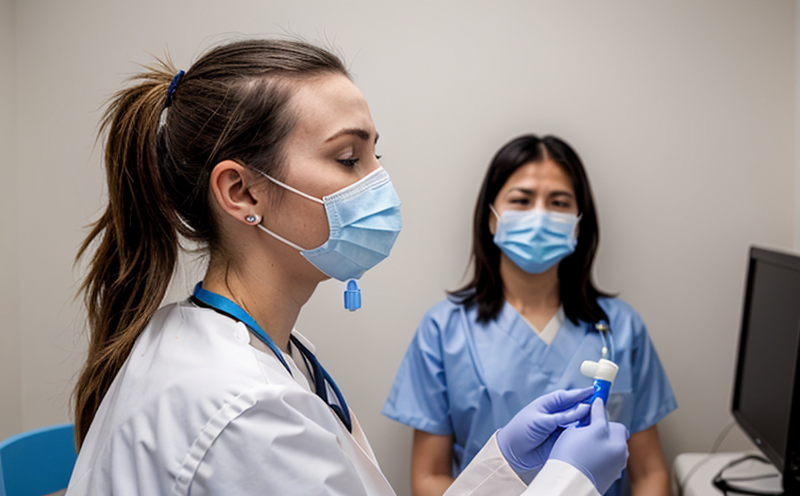Mycoplasma synoviae Respiratory Testing in Chickens and Turkeys
Respiratory diseases are significant challenges within poultry farming, often leading to substantial economic losses. Mycoplasma synoviae (MS), a bacterial pathogen, is one of the primary culprits affecting respiratory health, particularly among chickens and turkeys. This condition can lead to chronic respiratory disease, airsacculitis, and synovitis, impacting growth rates and overall productivity.
Testing for Mycoplasma synoviae is crucial in poultry farming as it helps in the early detection and management of infections. The aim is not only to diagnose infected birds but also to prevent further spread within the flock. This testing involves a series of steps, from sample collection to interpretation of results.
The process starts with collecting samples from affected birds, which can include swabs, tracheal aspirates, or air sac fluid. These samples are then transported under specific conditions to ensure viability during transport and analysis. Once received, the samples undergo a series of tests based on internationally recognized standards such as ISO 17025, ensuring accuracy and reliability.
One common method for detecting Mycoplasma synoviae is via PCR (Polymerase Chain Reaction) testing, which amplifies specific DNA sequences to detect the presence of the bacteria. This technique offers high sensitivity and specificity, making it an ideal choice for accurate diagnosis. Another method involves culturing samples in selective media that favor the growth of Mycoplasma species.
Once the tests are conducted, results are analyzed using advanced laboratory equipment that provides precise readings. The use of such sophisticated tools ensures that even the smallest traces of the pathogen can be detected. Interpretation of these results is critical and involves comparing them against internationally recognized thresholds to determine whether an infection is present.
The importance of accurate testing cannot be overstated, as it guides veterinarians and poultry farmers in making informed decisions about treatment options and biosecurity measures. By identifying infected birds early on, farmers can implement targeted treatments, minimize the spread within the flock, and reduce the overall impact on productivity.
Moreover, regular monitoring through testing helps in maintaining a healthy environment for the birds, contributing to better welfare and increased profitability. It also supports compliance with regulatory standards, ensuring that farms operate ethically and sustainably. The role of laboratories in this process is pivotal; they provide reliable data that can be used to make strategic decisions.
Understanding the dynamics of Mycoplasma synoviae infections requires a comprehensive approach. Factors such as environmental conditions, management practices, and genetic predispositions all play a part in the prevalence of these infections. Laboratories equipped with specialized expertise are essential in providing accurate diagnostics that can inform preventive measures and treatment strategies.
In conclusion, Mycoplasma synoviae respiratory testing is an indispensable tool for poultry farmers aiming to maintain optimal health within their flocks. By leveraging advanced diagnostic methods and adhering to strict quality control standards, laboratories play a critical role in supporting the industry's efforts towards sustainable and efficient farming practices.
Benefits
The benefits of Mycoplasma synoviae respiratory testing extend beyond mere diagnosis; they encompass several key areas that contribute to overall flock health and economic efficiency:
- Early Detection: Testing allows for the early identification of infected birds, enabling prompt treatment and isolation before the disease spreads.
- This minimizes the risk of further contamination, protecting both the affected flock and neighboring flocks.
- Improved Productivity: By identifying and managing infections early, farmers can enhance growth rates and reduce mortality rates among their birds.
- This leads to increased profitability through higher yields and better overall performance.
- Enhanced Biosecurity: Regular testing supports robust biosecurity measures, reducing the likelihood of disease introduction into clean flocks.
- This ensures a healthier environment for birds and contributes to long-term sustainability in poultry farming.
- Regulatory Compliance: Accurate testing aligns with regulatory requirements, ensuring that farms operate within legal and ethical standards.
- This builds trust with consumers and enhances the reputation of poultry producers.
Industry Applications
The application of Mycoplasma synoviae respiratory testing is widespread across the poultry industry, impacting various sectors:
- Veterinary Medicine: Testing supports veterinarians in diagnosing and treating infections effectively.
- This ensures that appropriate treatments are administered, reducing the spread of disease within flocks.
- Poultry Farming: Farmers use testing results to implement targeted interventions and improve flock health.
- This contributes to better welfare standards and increased productivity, leading to higher profitability.
- R&D Engineering: Testing data informs research and development efforts aimed at improving poultry health.
- This includes the development of new vaccines and treatment protocols that can further enhance flock resilience.
- Procurement: Accurate testing helps in sourcing healthy birds for breeding or production purposes.
- This ensures that only disease-free stock is introduced into farms, maintaining the integrity of the flock.
Quality and Reliability Assurance
The quality and reliability of Mycoplasma synoviae respiratory testing are paramount to its effectiveness. Laboratories must adhere to strict quality management systems, ensuring that every aspect of the testing process meets international standards such as ISO 17025:
- Sample Collection and Transport: Samples must be collected under controlled conditions to ensure their integrity during transport.
- This involves using appropriate materials and following specific procedures to prevent contamination or degradation.
- Analytical Methods: The use of validated analytical methods ensures accurate results, which are essential for making informed decisions.
- This includes the application of PCR testing and culture techniques that have been proven to be reliable and reproducible.
- Interpreting Results: Expert interpretation is necessary to correctly identify positive and negative results, avoiding false positives or negatives.
- This involves comparing test results against established thresholds for Mycoplasma synoviae.





